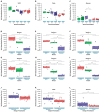Highly Thermotolerant SARS-CoV-2 Vaccine Elicits Neutralising Antibodies against Delta and Omicron in Mice
- PMID: 35458530
- PMCID: PMC9031315
- DOI: 10.3390/v14040800
Highly Thermotolerant SARS-CoV-2 Vaccine Elicits Neutralising Antibodies against Delta and Omicron in Mice
Abstract
As existing vaccines fail to completely prevent COVID-19 infections or community transmission, there is an unmet need for vaccines that can better combat SARS-CoV-2 variants of concern (VOC). We previously developed highly thermo-tolerant monomeric and trimeric receptor-binding domain derivatives that can withstand 100 °C for 90 min and 37 °C for four weeks and help eliminate cold-chain requirements. We show that mice immunised with these vaccine formulations elicit high titres of antibodies that neutralise SARS-CoV-2 variants VIC31 (with Spike: D614G mutation), Delta and Omicron (BA.1.1) VOC. Compared to VIC31, there was an average 14.4-fold reduction in neutralisation against BA.1.1 for the three monomeric antigen-adjuvant combinations and a 16.5-fold reduction for the three trimeric antigen-adjuvant combinations; the corresponding values against Delta were 2.5 and 3.0. Our findings suggest that monomeric formulations are suitable for upcoming Phase I human clinical trials and that there is potential for increasing the efficacy with vaccine matching to improve the responses against emerging variants. These findings are consistent with in silico modelling and AlphaFold predictions, which show that, while oligomeric presentation can be generally beneficial, it can make important epitopes inaccessible and also carries the risk of eliciting unwanted antibodies against the oligomerisation domain.
Keywords: AlphaFold; COVID-19; Omicron; SARS-CoV-2; biomolecular modelling; receptor-binding domain (RBD); thermotolerant vaccine; vaccine equity; vaccine matching; variants of concern (VOC).
Conflict of interest statement
The following authors declare these competing financial interest(s): A provisional patent application has been filed for the RBD formulations described in this manuscript. R.V., S.K.M., S.A., S.P. and R.S. are the inventors. R.V. is a co-founder, and S.P. and R.S. are employees of Mynvax Private Limited. The funders had no role in the design of the study; in the collection, analyses, or interpretation of data; in the writing of the manuscript, or in the decision to publish the results. All other authors declare no conflict of interest.
Figures





References
-
- WHO’s Chief Scientist Offers Bleak Assessment of Challenges Ahead. [(accessed on 25 February 2022)]. Available online: https://www.ft.com/content/69c75de6-9c6b-4bca-b110-2a55296b0875.
-
- Ritchie H.E., Mathieu L., Rodés-Guirao C., Appel C., Giattino E., Ortiz-Ospina J., Hasell B., Macdonald D., Roser M. Coronavirus (COVID-19) Vaccinations. 2020. [(accessed on 28 December 2021)]. Available online: https://ourworldindata.org/covid-vaccinations.
-
- Developing a Framework for Evaluating New COVID-19 Vaccines. [(accessed on 24 February 2022)]. Available online: https://www.who.int/news-room/events/detail/2022/02/23/default-calendar/....
-
- India’s Smart Vaccine Diplomacy. [(accessed on 25 February 2022)]. Available online: https://www.aspistrategist.org.au/indias-smart-vaccine-diplomacy/
Publication types
MeSH terms
Substances
Supplementary concepts
Grants and funding
LinkOut - more resources
Full Text Sources
Medical
Research Materials
Miscellaneous

